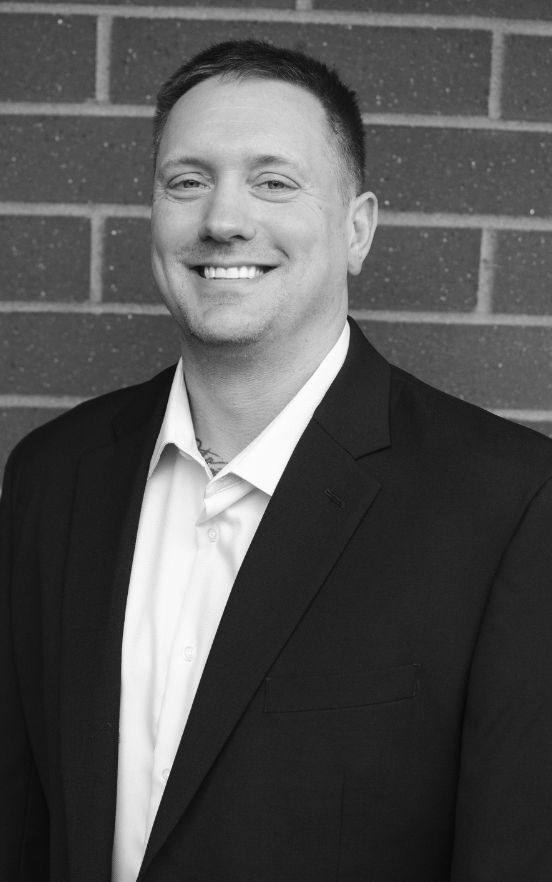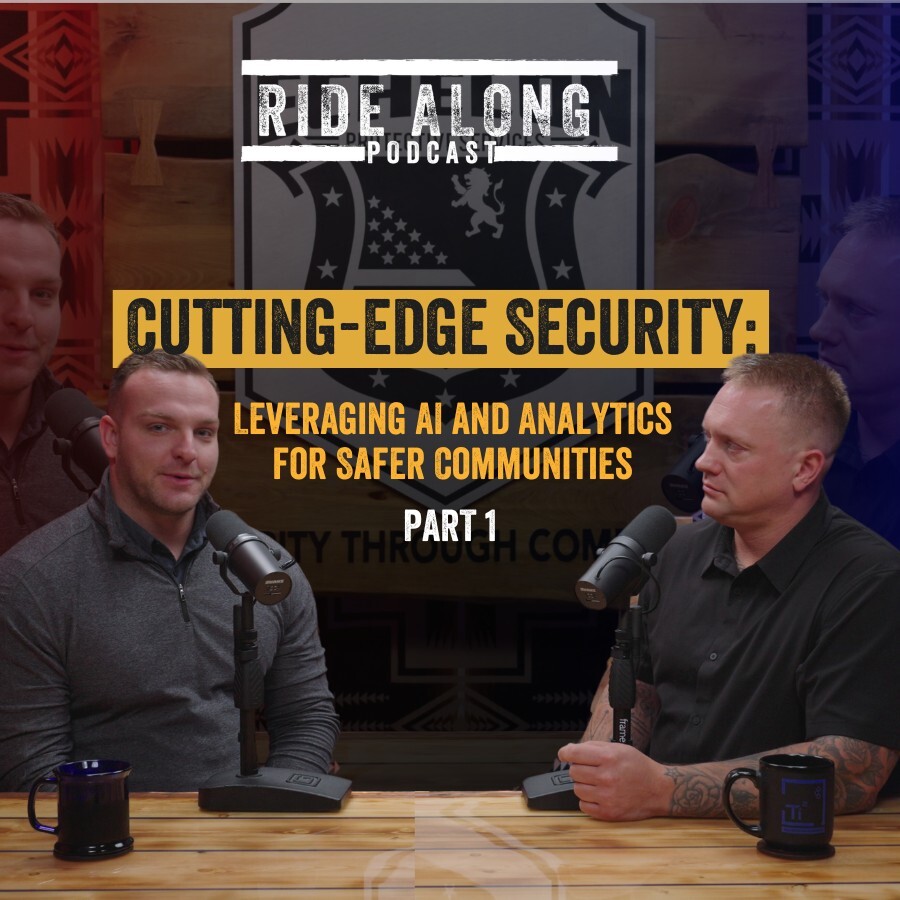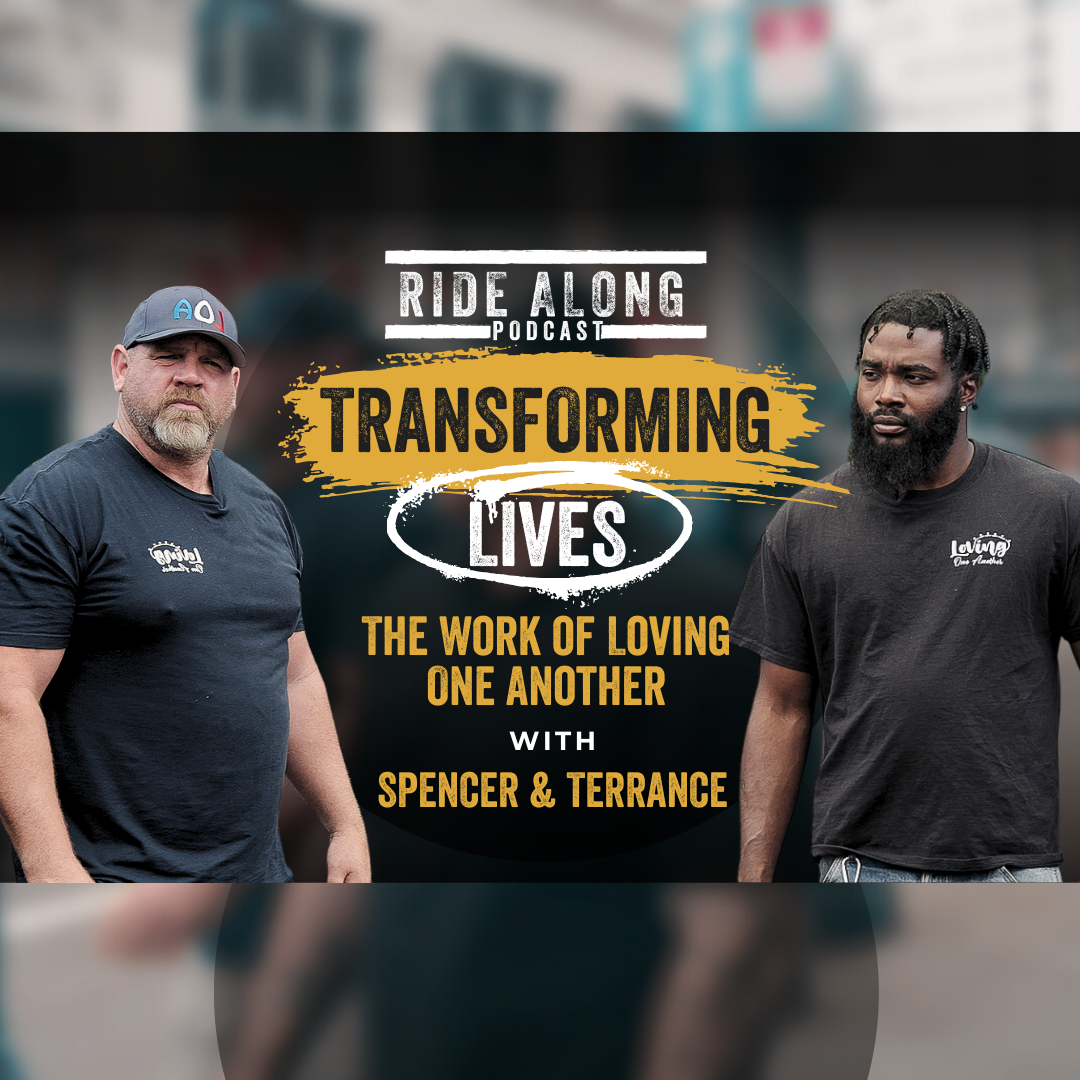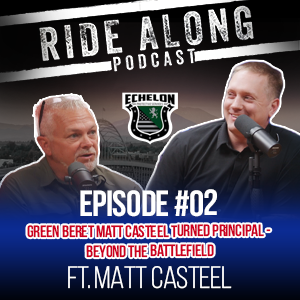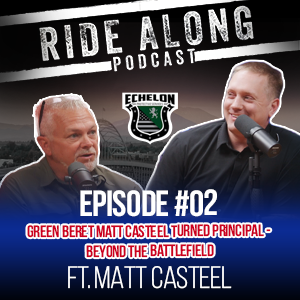Episode Transcript
[00:00:02] Speaker A: I'm Alex Stone, former military service member and law enforcement officer, now CEO of Echelon Protected Services, one of the fastest growing private security firms on the west coast. And this is ride along, where our guest and I witness firsthand the issues affecting our community.
I believe our proven method of enacting meaningful change through compassion and understanding is the best way to make our streets a safer place and truly achieve security through community.
[00:00:45] Speaker B: Hi, everyone. I'm John DiLorenzo. I'm an attorney specializing in government cases. I am passionate about trying to hone our governmental response to the homeless crisis. And I'm looking forward to the ride along today.
[00:01:01] Speaker A: Hey, Alex. Here. We're in the van. On the ride along, we picked up Boc. Bach went, and usually we wait, we meet him, he grabs supplies. We were running a little bit late today, so he went and grabbed all of his gear in the van, and we just jumped in with him. So we're gonna go to an area of the downtown corridor called the west end.
We're gonna go see what's going on. Pretty much. John loves it. Bucky, ready?
[00:01:30] Speaker C: Let's do it. Yeah. Day in and day out. Same old, same old.
[00:01:33] Speaker A: Day in and day out.
[00:01:34] Speaker C: Right.
Time card. Rent three p. Rent three p. Can.
[00:01:40] Speaker A: You give us a sit rep? Just on this past week, what's been going on?
[00:01:43] Speaker C: Yeah.
So if we run across Shanti, she's gonna be back out. She's one of the gals that we helped get into a shelter a little while ago.
[00:01:52] Speaker A: Yeah, Beaverton, right? Right near her family.
[00:01:55] Speaker C: Right. Very, very long story short, she got kicked out of that shelter.
Unfortunate set of circumstances. But if we find her, we've got another inn on a different shelter, and we can get her off the street again.
Hopefully that this time it'll stick. But, you know, we just put the bolo out. Hey, if you see her, give us a holler, and we can connect some dots again for her and help her get inside again.
[00:02:20] Speaker B: Can I ask why she got kicked out?
[00:02:23] Speaker C: I. The details on that I'm separated from, but I believe it has to do with narcotics use.
[00:02:29] Speaker A: Yeah, that's what I was told.
[00:02:32] Speaker B: So is that a low barrier or a high barrier or a middle barrier?
[00:02:37] Speaker A: That would be middle. Middle barrier, shelter. And this kind of goes back to our conversation in studio. Housing first isn't always best. If someone. She felt that her addiction wasn't strong enough, she could just stop, which for some people is a legitimate, you know.
[00:02:56] Speaker B: I am keenly looking out for any blockages and sidewalks. Given the case, we're involved in. And so far, I see none. And I see far fewer in the downtown core, although I am told that that's not the case on the east side right now.
[00:03:19] Speaker A: No, the east side's a complete mess.
Well, the central east side almost. I don't think. I think they lost service with their provider. They couldn't hire anybody. They wanted to hire us. I was like, this is.
[00:03:31] Speaker B: Are we gonna have a chance to whip over there to take a look.
[00:03:33] Speaker A: At the east side?
[00:03:34] Speaker B: Close in?
[00:03:36] Speaker A: We can go anywhere you want, John.
[00:03:38] Speaker B: I'd like to see how. I'd like to compare the west side district here versus the east side to determine whether the clearing of the tents is more attributable to actions the city has taken under our settlement agreement versus the presence of private security.
[00:03:59] Speaker C: That guy couldn't. Alex, to your left.
[00:04:01] Speaker A: Sure.
[00:04:02] Speaker C: Okay.
[00:04:03] Speaker B: I couldn't even distinguish the graffiti from the.
[00:04:06] Speaker A: You're gonna talk to him, Buck?
[00:04:08] Speaker C: Sure. I'm happy to.
[00:04:10] Speaker A: Your building? Yeah, I'm not gonna go out with him. It's just one guy. I feel overwhelming.
[00:04:15] Speaker B: Okay.
[00:04:17] Speaker A: Yeah.
[00:04:17] Speaker C: So we're at your property, my man.
[00:04:19] Speaker A: Someone's smoking fentanyl.
[00:04:20] Speaker C: Can you pick up your stuff for me? You tell kids, their kids that live here.
[00:04:24] Speaker A: Bro, he's smoking from a straw. Yeah.
[00:04:25] Speaker C: Thank you. Thank you, buddy. I appreciate that. It's nothing personal, ma'am, but I mean.
[00:04:28] Speaker A: You know how, again, you know, we don't want to. I'm not necessarily for criminalization of narcotics. I don't want people to go to prison for 20 years. You know, like, this is the seventies, and it's a marijuana joint.
[00:04:39] Speaker B: Yeah.
[00:04:40] Speaker A: But at the same time, your residents should not have to, if they have their window open, fentanyl smoke should be wafting into the residence.
[00:04:49] Speaker B: Right.
[00:04:50] Speaker A: I mean, it's. You have windows here.
[00:04:52] Speaker B: So. Bach, what happened?
[00:04:53] Speaker C: Uh, he started. He stopped right when I started walking up, and then he threw his foil down.
[00:04:57] Speaker B: Yeah.
[00:04:57] Speaker C: And I said, hey, my man, can you pick up your foil? I mean, there's people and kids that live here, and they're be exposed. He goes, okay, no problem. He turned out, picked up his foil and then left.
[00:05:05] Speaker B: He left. So he was polite?
[00:05:06] Speaker C: Yes.
[00:05:07] Speaker B: All right.
[00:05:08] Speaker A: Yep. So you know when you had called two weeks ago and you were in DC?
[00:05:12] Speaker B: Yeah.
[00:05:12] Speaker A: We had multiple, like, five tents out in this location right here.
[00:05:16] Speaker B: Really?
[00:05:17] Speaker A: Yeah.
And it took like, nine days. They were pretty. They were violent. They had made multiple threats to us, and we kept working with them, working with them, you know, and we actually got two people to shelter and so that was actually a pretty good campaign, to be honest. And the sidewalk was not navigable.
[00:05:37] Speaker B: Yeah, I know. I get it.
[00:05:38] Speaker A: That's the main problem is like, this is a hospital, right.
[00:05:41] Speaker B: And they called me and I called you and you were already on it. That's my understanding.
[00:05:46] Speaker A: Make a luck to your and then come back around.
[00:05:48] Speaker C: You'll be fine.
[00:05:49] Speaker B: I mean, everything is pretty clear down there. That's actually turning into a pretty cool restaurant district now.
[00:05:56] Speaker A: Yeah, yeah. We saw the construction going on and.
[00:06:00] Speaker B: Evidently they're going to be allowed to keep their outdoor service area, which is great.
[00:06:04] Speaker A: Yeah, there's, isn't there a campaign to.
[00:06:05] Speaker B: Actually make them permanent? Yeah, yeah, I think it's a good idea. As long as they allow people with wheelchairs through.
[00:06:12] Speaker A: Exactly.
[00:06:13] Speaker B: Yeah.
[00:06:14] Speaker A: Share the road.
[00:06:15] Speaker B: See, like right here, they've done a nice job of that.
[00:06:17] Speaker A: They've done a really good job. Hey, so we're in the west end. We're patrolling here. John Delorenzo, Michael Bach in the back. John, give us kind of your highlights. This is your area right here.
[00:06:28] Speaker B: Yeah. Well, this is the aftermath of the 12th and Taylor experience that we talked about in the studio. And what we decided to do, do, to keep some control in the entire neighborhood was to recruit all the business owners and the building owners and participate for every quarter block.
And we now have full time coverage in this rectangle. Yes, that goes for quite some time. And it's a non profit taxable corporation that services the securities contract, the security contract, and, but for one non governmental organization up here, it is pretty free of tents. So here, for instance, is a tent on the odot right away, but it does not, man, it's somewhat blocking a sidewalk, but that sidewalk is used as much as the sidewalks on the left hand side. Yeah, it looks like there was a major cleanup operation here last week, and now it looks like some of these tents are returning. And, you know, one of my criticisms of our waste of money is that when the city clears these tents, they hire a company that charges bioremediation, hazard fees.
So look what's going on here.
And they spend all the money and then they do no follow up.
[00:08:11] Speaker A: That's right.
[00:08:11] Speaker B: And so people just move right back. I just saw a picture of a kid who was on the news there about a week and a half ago who had to move, and now he's back. So, you know, what is this? It's sort of like the dig the hole routine and cool hand loop in the movie.
You know, Luke digs the hole and then somebody comes by and says, what'd you dig that hole for? Fill it up. And he fills it up, and then they have to dig the hole again. Yeah, but, I mean, how are we spending our money?
We're digging holes, filling them up. Digging holes, filling them up.
[00:08:46] Speaker A: Yeah, that's.
And, you know, when government grows beyond its ability to keep the shared vision, or any organization, for that matter, this is what happens.
[00:09:00] Speaker B: Well, it's a matter of leadership, and there's a shortage of that.
[00:09:04] Speaker C: John, we just traveled through West End, the west end security district. Have other portions of the city seen the success that's occurred here and wanted to replicate that? I mean, you have any feedback from other areas in the city?
Because it seems like when your boots on the ground out here, that a lot of what's happening here has been positive.
[00:09:22] Speaker B: Oh, absolutely.
Other than a few tents that are encouraged by one particular nonprofit, the districts like night and day compared to what it used to be like. So I attribute that.
I attribute the lack of. Of tents on sidewalks to the ADA settlement. I attribute the rest of these conditions around the district to the presence of security.
[00:10:00] Speaker C: The outreach model that we're doing right now really seems effective, and I'm telling you that because when I'm on the ground, I'm seeing lots of people that are accepting help and accepting resources and accepting the referral to shelters and to addiction recovery and so forth.
[00:10:18] Speaker B: No, absolutely. And, you know, I would think that the presence of security could also be welcomed by people who are stuck in the elements because you contribute to their safety, too, always.
[00:10:30] Speaker A: Yep. And we tell them that, hey, we're here for your safety.
[00:10:33] Speaker B: Right. I mean, if you. If you saw someone being abused in a tent, you would immediately.
[00:10:41] Speaker C: I'd intervene. Absolutely.
[00:10:42] Speaker B: Intervene.
[00:10:43] Speaker C: Yeah, in one way or another, you know, I mean, if I'm outnumbered ten to one, I'm still calling police and doing the best I can. But the point being is that, you know, you can't turn a blind eye to somebody out here being hurt. And I think if people begin to engage in the mindset of being able to help and love another person and lifting them up out of the situation, it actually can really help. I mean, a lot of the people that we run into out here are react to me positively, and they approach me, hey, how you doing? How's it been? You know, that kind of thing. And it's not what I expected it to be when we first started out. I expected it to be always hostile, and it's just not the case.
[00:11:24] Speaker A: Hey, so we've been patrolling here at the west end DiLorenzo balk in the back, and I think we're going to hit a little bit more of the area, and then we're going to head over to the east side and we'll catch up when we get over there. So we just rode through the north park blocks.
[00:11:38] Speaker B: Yeah.
[00:11:39] Speaker A: And in the north park plots, there was a crip memorial where a guy was shot there. We've had multiple gang shootings. We responded to one. We were a block away. We put a tourniquet on. Someone saved their life.
[00:11:48] Speaker C: And there's another memorial up, too.
[00:11:52] Speaker A: Yeah. And that memorial is gone now. So I met with command staff. It looks like PPB was able to successfully get that memorial moved.
[00:12:00] Speaker B: Yeah, yeah.
[00:12:02] Speaker A: And the car that was there.
So these OG crips would then hang out, and they would stand between the memorial and this abandoned vehicle that looks stolen.
[00:12:11] Speaker B: Why would the city not do anything about this under our settlement agreement when it's blocking the entire sidewalk?
[00:12:18] Speaker A: I have a feeling they're still going by the algorithm, just between you and I, but. Because they have to do resource allocation somehow.
[00:12:26] Speaker B: Right?
[00:12:27] Speaker A: How has that changed under the new agreement? I don't think it has.
[00:12:30] Speaker B: Well, no. They have to devote 45% of their total camp removals and 45% of the total resources they spend on clearing sidewalks.
[00:12:47] Speaker A: Keeping them ADA compliant. Yeah, we spend a lot of our time on the west side. So in Portland, that is basically the zone on the west side of the river. So we're the city of bridges and we're going from the west side to the east side on the other side of the river. Check out some neighborhoods up there.
[00:13:03] Speaker B: Well, this is certainly unscientific, but we're just making a visual comparison between what a highly patrolled west end security district looks like now versus a not so highly patrolled area of close side.
And it looks like, with the exception of a few tents, most of the sidewalks are still clear, but there are areas under bridges that are just completely blocked.
[00:13:39] Speaker A: We're in east Portland, so again, we're that contrast of east west and our most tight knit district with the west end.
[00:13:48] Speaker B: Well, this looks pretty free of tenant canvas.
[00:13:53] Speaker A: Yeah, yeah, we. Well, we just moved two camps. We got actually three people to shelter that were on the custom blocks for two weeks. We got them into a tiny home village, actually, all three of them.
[00:14:02] Speaker B: There's one there.
[00:14:04] Speaker C: Yeah, that one's a complete obstruction. And we're right up by goat block. So if you hang a left again, we can go back over towards the goat. But you can see right over here behind us, there's a several encampments.
[00:14:17] Speaker A: Yeah. Here and this here, it's a huge. Like that. The whole sidewalk was taken up. Huge, giant. It's mostly. It's almost like six tenths.
[00:14:23] Speaker C: Yeah.
[00:14:24] Speaker A: Because they have access to all these pallets.
So they're almost like permanent structures.
[00:14:29] Speaker C: Almost, yeah.
[00:14:31] Speaker A: And asking someone to move that is, you know, it's a big deal. They put 20 hours into just building it. So we're out patrolling. John, what are your thoughts? You know, the contrast between both sides of the city and just overall, what are you. What are your thinking?
[00:14:44] Speaker B: Well, I think although a security presence probably helps encourage campers to relocate off of sidewalks, obviously the city is doing a great deal to get them off the sidewalks, too. I think the value in having organized security in districts is more prophylactic. It keeps the problem from returning.
And so I can tell that the Westside security district has been relatively free of tents for months now.
And, you know, I regularly look at it to see.
On the other hand, we have a lot of tents coming and going in areas that are not adequately controlled.
So that's the first thing. The second thing is, I can't help but think a patrolling presence helps keep down property crime, too. But I can't really judge that, you know, being there on this side.
But overall, I mean, my one disappointment is that the city does not appear to be doing much with respect to the birdside bridge and those sidewalks that are completely blocked, which is critical.
[00:16:14] Speaker A: You have people on bicycles.
[00:16:16] Speaker B: Yeah.
[00:16:16] Speaker A: They need to walk.
[00:16:17] Speaker B: You need to be able to get over the bridge.
[00:16:18] Speaker A: Over the bridge.
[00:16:19] Speaker B: So that'll be one of my calls here the next day or so. But other than that, no, I do. This makes me more resolute in my view that there's a real value in these security districts.
[00:16:36] Speaker A: Absolutely. Yeah. So, John, we just got done patrolling the east side and the west side, finished, wrapped up in the studio. I want to thank you for coming out and doing the ride along with us. What are your final thoughts on all this?
[00:16:49] Speaker B: Well, here are my final thoughts. I took lots of notes.
[00:16:51] Speaker A: You did good notes.
[00:16:53] Speaker B: I see the value in private security two fold, keeping our property safe, and, of course, keep me safe.
[00:17:01] Speaker A: Yeah.
[00:17:02] Speaker B: So thank you very much. I really appreciate it. It's a pleasure.
[00:17:05] Speaker A: Well, thanks for coming out. Thanks for watching the ride along. You're welcome, Bach. Always pleasure to be with you.
[00:17:09] Speaker C: Yep.
[00:17:10] Speaker A: You know, we didn't get a lot of stuff on the ground today. We're kind of like, we wanted to go out into the districts and compare and contrast based on the work that not only we've done, but really that John has done, because we want to highlight that we're not the only people out here working solutions. John's working solutions as well. So many other people working solutions. Thanks again for coming on the ride along walk. Thank you. We'll catch you next time.
[00:17:31] Speaker B: Pleasure. Thanks.

